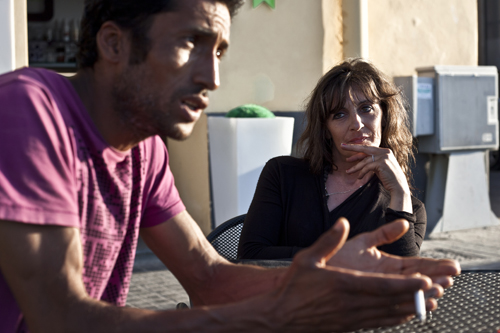
Sakina and Khayri, photo by Alessio Genovese
He says it in French, because Sakina does not know Arabic. Her real name is Patricia and she comes from Paris. She was born in 1967, the daughter of an Andalusian mother and a French father. Behind her she has left a broken marriage and five children. But ahead of her is a new life to rebuild along with Khayri. This is why she’s in Trapani: she has come to get her husband back. That she’s a tough woman you can tell straight away. The tough look, the voice, ready to attack, and the large cross tattooed on her left arm above the drawing of a pierced heart, souvenir of her youth spent in the banlieue. Sakina betrayed only one moment of weakness, when she saw the camp of Chinisia for the first time. That evening, her eyes filled with tears and her words were full of anger and despair: "I'll burn myself alive in front of the centre, I will be the first martyr, but my husband will not remain locked up in that cage."
Yet to see her now she’s a different person. It took only a moment. When the police inspector on duty authorised the meeting with her husband, Khayri didn’t spare much of the formalities. And he embraced her, with closed eyes and whispered words. At that moment the features of her face contracted and melted into tears and smiles. The first, after months of separation. The first since Khayri drove her away from Tunisia.
Sakina still remembers the date. It was on 8 April. They had never fought so hard. But this time Khayri would not listen. He forced her into a cab to Tunis, with a plane ticket to Paris. She had to leave immediately. They would talk about the rest over the phone. One of Khayri’s brothers, Ridha, had already been killed. He would not allow the mafia to kill his wife as well. As long as the threats were for him, he was able to defuse them. After all, he’d been involved in politics for years. At Gabès they all knew him as a committed artist. How many statues, how many paintings, how many banners printed in his press and how many flags. Like that extremely long one, which he sewed in the days of the demonstrations in Nahal, with the names of all the martyrs of the Jasmine Revolution.
The first warning came at night, with gunshots aimed at the sky, just outside his home. Then there was that phone call, and those threats, which had never been so explicit, aimed for the first time at his partner. The message was clear: Khayri had been too exposed during the demonstrations against the dictatorship. And it was time to pay the price to the local mafia, linked to the now deposed regime of Ben Ali and engaged in a struggle for the preservation of power in post-revolutionary Tunisia. Khayri loved Tunisia, he loved freedom and revolution. But he loved his wife more. And so he decided to leave his land.
After landing in Lampedusa, he was caged. After two months he returned to freedom, because the magistrate found his asylum application credible and ordered his transfer to a reception centre for asylum seekers.
Sakina is with him. They are starting over, together, from Trapani. With the first taste of almond ice cream and the fig trees on a terrace facing the sea. And then onwards. Music blaring in the car, windows open among the salt marshes and old windmills. Before they spend what little money is left over for a hotel room where they can meet again. Only to leave once more, the next day, without documents. Destination: France. And freedom. The same freedom that someone else has to take back by force in Chinisia. Because Sakina is not the only woman who came to Sicily to get her husband back.
Read also:
Love in the time of frontiers. Winny and Nizar
Love in the time of frontiers. Nathalie and Salah
translated by Camilla Gamba